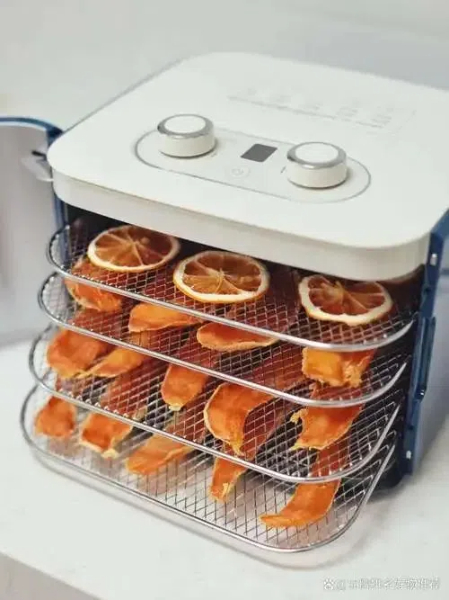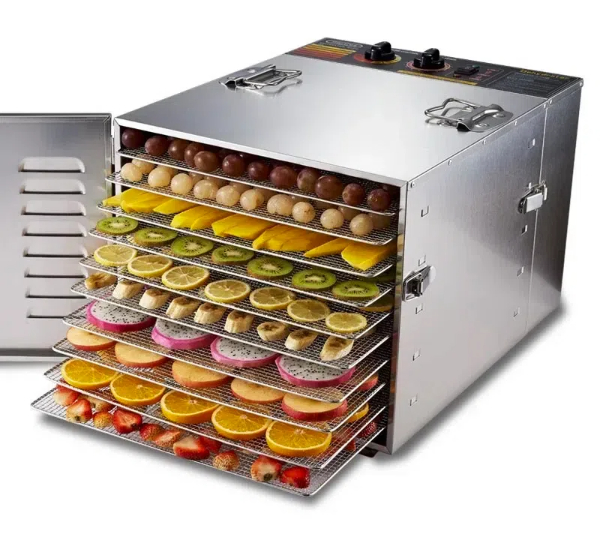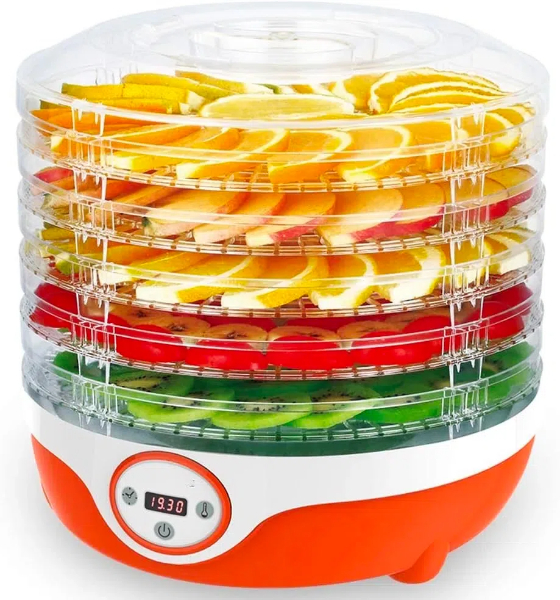
Content Menu
● Introduction
● Understanding Fruit Dehydration
>> The Science Behind Fruit Drying
>> Benefits of Dried Fruits
● Types of Fruit Dryer Machines
>> Home Fruit Dehydrator Machines
>> Commercial Food Dehydrators for Fruits
>> Industrial Fruit Drying Equipment
● Fruit Drying Techniques
>> Traditional Air Drying
>> Solar Fruit Dryers
>> Machine Dehydration
● Energy-Efficient Fruit Dehydration
>> Heat Pump Technology
>> Smart Controls
● Choosing the Right Fruit Dryer Machine
>> Capacity
>> Energy Efficiency
>> Temperature Range
>> Ease of Use
>> Noise Level
● Fruit Dehydrator Comparison
● Fruit Preservation Methods
>> Freezing
>> Canning
>> Freeze-Drying
● Creating Healthy Snacks with Dried Fruits
>> Recipe Ideas
>> Nutritional Benefits
● Maintenance and Care of Fruit Dryer Machines
>> Cleaning
>> Storage
>> Regular Checks
● The Future of Fruit Drying Technology
● Conclusion
● Frequently Asked Questions
>> 1. Q: What is the best temperature for drying fruits?
>> 2. Q: How long does it take to dry fruits in a dehydrator?
>> 3. Q: Are homemade dried fruits healthier than store-bought ones?
>> 4. Q: Can I use a fruit dryer machine for other foods?
>> 5. Q: How do I prevent fruits from sticking to the dehydrator trays?
Introduction
In recent years, the popularity of fruit dryer machines has skyrocketed, with more people recognizing the benefits of preserving fruits through dehydration. Whether you're a health-conscious individual looking to create nutritious snacks or a business owner seeking to expand your product line, understanding the world of fruit dehydrators is essential. This comprehensive guide will explore everything from the best fruit dehydrator reviews to industrial fruit drying equipment, helping you make informed decisions about this versatile technology.
Understanding Fruit Dehydration
The Science Behind Fruit Drying
Fruit drying is an ancient preservation method that has been modernized with technology. The process involves removing moisture from fruits, which inhibits the growth of bacteria, yeast, and mold, thus extending the shelf life of the produce. Modern fruit dryer machines use controlled heat and air circulation to achieve optimal results.
Benefits of Dried Fruits
Dried fruits offer numerous advantages:
- Longer shelf life
- Concentrated flavors and nutrients
- Convenient, portable snacks
- Versatile ingredients for cooking and baking
- Reduced food waste

Types of Fruit Dryer Machines
Home Fruit Dehydrator Machines
For individuals and families, home fruit dehydrator machines are an excellent investment. These compact devices are perfect for creating healthy snacks with dried fruits and experimenting with various fruit drying techniques.
Key features to look for in home dehydrators include:
- Multiple trays for batch processing
- Adjustable temperature controls
- Even heat distribution
- Quiet operation
- Easy-to-clean components
Commercial Food Dehydrators for Fruits
Businesses looking to produce dried fruits on a larger scale should consider commercial food dehydrators. These machines are designed for higher capacity and more consistent results.Commercial dehydrators often feature:- Stainless steel construction for durability- Large capacity with multiple trays- Precise temperature and humidity controls- Energy-efficient designs- Advanced air circulation systems
Industrial Fruit Drying Equipment
For large-scale operations, industrial fruit drying equipment is necessary. These systems are capable of processing vast quantities of fruits efficiently.
Industrial systems may include:
- Conveyor belt dryers
- Freeze dryers
- Spray dryers
- Tunnel dryers
- Batch dryers
Fruit Drying Techniques
Traditional Air Drying
While not as efficient as machine drying, traditional air drying is still practiced in some regions. This method involves exposing sliced fruits to warm, dry air, often in sunlight.
Solar Fruit Dryers
DIY solar fruit dryers have gained popularity as an eco-friendly alternative. These systems harness the sun's energy to dry fruits, making them an excellent option for off-grid locations or those seeking to reduce energy costs.
Machine Dehydration
Modern fruit dryer machines offer the most control over the drying process. They allow for precise temperature settings and consistent results, making them ideal for both home and commercial use.
Energy-Efficient Fruit Dehydration
As energy costs rise and environmental concerns grow, energy-efficient fruit dehydration has become a priority for many users. Manufacturers are responding with innovative designs that maximize output while minimizing energy consumption.
Heat Pump Technology
Some advanced fruit dryer machines incorporate heat pump technology, which recirculates warm air to improve efficiency. This can result in significant energy savings compared to traditional heating elements.
Smart Controls
Many modern dehydrators feature smart controls that optimize energy use based on the type and quantity of fruit being dried. These systems can adjust temperature and airflow automatically, ensuring the best results with minimal waste.

Choosing the Right Fruit Dryer Machine
When selecting a fruit dryer machine, consider the following factors:
Capacity
Determine how much fruit you plan to dry regularly. This will help you choose between home, commercial, or industrial models.
Energy Efficiency
Look for energy-efficient models to reduce operating costs and environmental impact.
Temperature Range
Different fruits require different drying temperatures. Ensure the machine you choose offers a suitable range for your needs.
Ease of Use
Consider features like digital controls, preset programs, and easy-to-clean components.
Noise Level
If using the dehydrator at home, noise level can be an important factor, especially for overnight operation.
Fruit Dehydrator Comparison
To help you make an informed decision, here's a comparison of popular fruit dehydrator models:
1. Entry-level home dehydrator
- Pros: Affordable, compact, easy to use
- Cons: Limited capacity, basic features
2. Mid-range home dehydrator
- Pros: Larger capacity, more temperature control options
- Cons: Higher price point, may require more counter space
3. Professional-grade home dehydrator
- Pros: Advanced features, durable construction, large capacity
- Cons: Expensive, may be overkill for casual users
4. Commercial dehydrator
- Pros: High capacity, precise controls, energy-efficient
- Cons: Significant investment, requires more space
5. Industrial dehydrator
- Pros: Massive capacity, automated processes
- Cons: Very expensive, requires dedicated space and setup
Fruit Preservation Methods
While dehydration is an excellent preservation method, it's worth exploring other techniques to complement your fruit drying efforts:
Freezing
Freezing fruits can preserve their nutritional value and is ideal for fruits that don't dehydrate well.
Canning
Canning is another traditional method that works well for fruits with high water content.
Freeze-Drying
Although more expensive, freeze-drying can produce high-quality dried fruits with excellent flavor retention.
Creating Healthy Snacks with Dried Fruits
One of the most popular uses for fruit dryer machines is creating healthy snacks. Dried fruits offer a convenient and nutritious alternative to processed snacks.
Recipe Ideas
1. Homemade trail mix with dried fruits and nuts
2. Fruit leather rolls
3. Dried fruit and granola bars
4. Infused dried fruit teas
5. Dried fruit-based energy balls
Nutritional Benefits
Dried fruits are packed with nutrients, including:
- Fiber
- Vitamins (especially A and C)
- Minerals (such as potassium and iron)
- AntioxidantsHowever, it's important to note that the drying process concentrates sugars, so moderation is key when consuming dried fruits.
Maintenance and Care of Fruit Dryer Machines
To ensure your fruit dryer machine lasts for years and produces high-quality dried fruits, proper maintenance is essential.
Cleaning
- Clean trays and other removable parts after each use
- Wipe down the interior of the machine regularly
- Use food-safe cleaning products to avoid contamination
Storage
- Store the dehydrator in a clean, dry place when not in use
- Cover the machine to prevent dust accumulation
Regular Checks
- Inspect heating elements and fans for proper function
- Check seals and gaskets for wear and tear
- Calibrate temperature controls periodically
The Future of Fruit Drying Technology
As technology advances, we can expect to see further innovations in fruit drying machines:
- Integration with smart home systems for remote operation
- Improved energy efficiency through advanced materials and designs
- Enhanced sensors for more precise drying based on fruit type and moisture content
- Incorporation of artificial intelligence for optimal drying programs
Conclusion
Fruit dryer machines have revolutionized the way we preserve and enjoy fruits. From simple home dehydrators to sophisticated industrial equipment, these devices offer a range of options for creating healthy snacks, extending shelf life, and reducing food waste. By understanding the different types of fruit dryers, drying techniques, and factors to consider when choosing a machine, you can make the most of this versatile technology. Whether you're a health-conscious individual or a business owner looking to expand your product line, fruit dehydration offers exciting possibilities for the future of food preservation and snack creation.

Frequently Asked Questions
1. Q: What is the best temperature for drying fruits?
A: The ideal temperature for drying fruits typically ranges between 125°F to 135°F (52°C to 57°C). However, this can vary depending on the specific fruit and desired outcome. Lower temperatures may be used for delicate fruits or to preserve more nutrients, while higher temperatures can speed up the drying process.
2. Q: How long does it take to dry fruits in a dehydrator?
A: Drying times can vary greatly depending on the fruit, its water content, and the dehydrator's efficiency. On average, it can take anywhere from 6 to 36 hours. For example, thin apple slices might dry in 6-8 hours, while whole strawberries could take 24-36 hours.
3. Q: Are homemade dried fruits healthier than store-bought ones?
A: Homemade dried fruits can be healthier as you have control over the process and can avoid added sugars or preservatives often found in commercial products. However, the nutritional value largely depends on the fruit quality and drying method used.
4. Q: Can I use a fruit dryer machine for other foods?
A: Yes, most fruit dryer machines are versatile and can be used for various foods including vegetables, herbs, meats (for jerky), and even flowers. Always check your machine's manual for specific guidelines on drying different types of food.
5. Q: How do I prevent fruits from sticking to the dehydrator trays?
A: To prevent sticking, you can lightly oil the trays with a food-safe oil spray, use parchment paper or silicone mats, or flip the fruits halfway through the drying process. Some dehydrators come with non-stick mesh screens which can also help.












